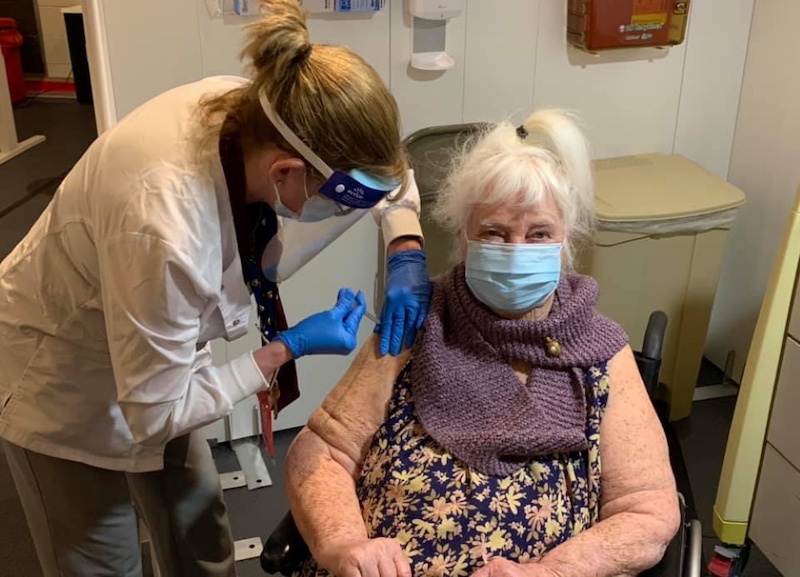By Colin A. Young
State House News Service
Beginning Monday, roughly 94,000 people living and working in congregate care settings like group homes, shelters, residential treatment programs and correctional facilities will start to receive the COVID-19 vaccine as the state continues its effort to blunt the impact of the coronavirus.
Congregate care settings, where people live and work in close proximity to others and where residents sometimes have complex medical needs, have been prioritized to become eligible for the vaccine as part of the first phase of the state’s vaccination plan, and the governor’s announcement that shots for many will begin Monday came as a relief to care providers and family members.
Diane Gould, president and CEO of Advocates, said her organization serves people who have intellectual and physical disabilities, autism, serious mental health conditions, and substance use problems. She said the last several months have been particularly difficult for the people her organization serves.
“We’re very excited about this plan, as are the families we support. In fact, we had a family forum just last night in which we provided education and answered questions, and to a person, family members spoke about their immense relief and appreciation that their loved ones would soon be vaccinated,” she said. “All in all, this is going extremely well. It is a bright light in what has otherwise been a very dark time.”
Some congregate care facilities that have enrolled in the Federal Pharmacy Partnership (FPP) Program with CVS and Walgreens have already begun the vaccination process, Gov. Charlie Baker said, but Monday will mark the beginning of inoculation for about 3,500 sites, plus the corrections system.
“These facilities are prioritized because they serve vulnerable populations in densely populated settings, which means they’re at significant risk for contracting COVID-19,” Baker said. “The staff are also high risk for exposure at these facilities, and many of them do amazing work and it’s important that they’re vaccinated to protect themselves and their families.”
For non-correctional congregate care facilities, there are three options for residents and staff to become vaccinated. First, organizations that have the ability to do so can “self-administer” the vaccine to their residents and staff if they meet the state’s criteria and plan to vaccinate at least 200 people. In cases like that, the program would receive the vaccine doses directly from the Department of Public Health.
Programs that have existing relationships with pharmacies, hospitals or other providers for things like annual flu shots can arrange to have residents and staff vaccinated through those partnerships. In those cases, DPH will allocate doses directly to the clinical partner.
The third option is to have residents and staff of congregate care centers receive their shots at one of the mass vaccination sites that are expected to be established. The one announced so far, at Gillette Stadium in Foxborough, is also serving first responders starting Monday with the initial capacity to deliver just 300 shots per day.
“We are working with each provider on the entirety of their congregate care and shelter site lists to make sure that every provider and every site, whether they were matched to the FPP or not, has a vaccination administration plan under development,” Health and Human Services Secretary Marylou Sudders said. “Our programs have different clinical capacity partnerships and serve residents with different needs, which requires us to employ a range of strategies. One size does not fit all.”
For facilities operated by the state Department of Correction, about 6,500 inmates and 4,500 officers and staff members are expected to get the vaccine in the three weeks following Monday, Baker said. Inmates will get their vaccines from Wellpath, DOC’s medical provider, and employees will be able to get vaccinated at regional vaccine sites the state is working to establish. In county houses of correction, in-house medical staff will administer the jabs.
Baker also announced Wednesday that residents and staff at public and private low-income and affordable senior housing around Massachusetts have been moved up to the first step of Phase Two of the vaccine distribution plan, which means they are now expected to get vaccinated sometime in February.
“This is just so great,” an exuberant Amy Schectman, president and CEO of 2Life Communities, said. “I’m so happy. This is just a really important milestone for older adults living in subsidized housing. They face a double threat from COVID, by virtue of their age more vulnerable to serious illness and death, and also more at risk for the dire consequences of social isolation.”
About 29.38 million doses of COVID-19 vaccine have been distributed nationwide and about 10.28 million people have received at least the first of two doses, according to the U.S. Centers for Disease Control. In Massachusetts, 656,850 doses have been distributed and nearly 217,500 people here have received the first shot, the CDC said.
Massachusetts has administered fewer doses on a per capita basis than any of its surrounding states and the vaccine has been made available so far primarily to COVID-facing health care workers, long-term care residents, and first responders.
Massachusetts might eventually get to the point that mass vaccination sites are inoculating people of any age or profession at a rapid clip, Baker said Wednesday as he defended the way his administration has made the COVID-19 vaccine available.
“I know this isn’t popular, but I really hope that early on we are able, with the vaccine that’s available, to hit the populations for whom life is most at risk and for whom the health care system relies on and depends on to provide care. I do know that in a lot of states, people who are the same age as my kids have gotten vaccinated before people who are home health workers or health care workers or long-term care workers or long-term care residents or some of these other populations or people who have multiple comorbidities and are over the age of 70,” the governor said in response to a question about vaccinations in Arizona. “Honestly, I just don’t think that’s the way we should do this. I think the focus early on should be on those who have the most to lose or who are fundamental to our ability to take care of those who have the most to lose.”
 New Bedford Guide Your Guide to New Bedford and South Coast, MA
New Bedford Guide Your Guide to New Bedford and South Coast, MA









